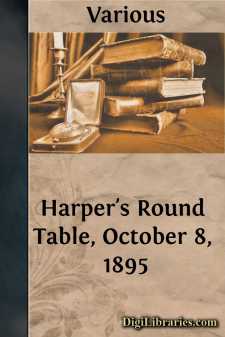Categories
- Antiques & Collectibles 13
- Architecture 36
- Art 48
- Bibles 22
- Biography & Autobiography 813
- Body, Mind & Spirit 142
- Business & Economics 28
- Children's Books 15
- Children's Fiction 12
- Computers 4
- Cooking 94
- Crafts & Hobbies 4
- Drama 346
- Education 46
- Family & Relationships 57
- Fiction 11828
- Games 19
- Gardening 17
- Health & Fitness 34
- History 1377
- House & Home 1
- Humor 147
- Juvenile Fiction 1873
- Juvenile Nonfiction 202
- Language Arts & Disciplines 88
- Law 16
- Literary Collections 686
- Literary Criticism 179
- Mathematics 13
- Medical 41
- Music 40
- Nature 179
- Non-Classifiable 1768
- Performing Arts 7
- Periodicals 1453
- Philosophy 64
- Photography 2
- Poetry 896
- Political Science 203
- Psychology 42
- Reference 154
- Religion 513
- Science 126
- Self-Help 84
- Social Science 81
- Sports & Recreation 34
- Study Aids 3
- Technology & Engineering 59
- Transportation 23
- Travel 463
- True Crime 29
Harper's Round Table, October 8, 1895
by: Various
Description:
Excerpt
The Happy Thought, as will be remembered by those who have read "The Longmeadow Toll-Gate," was a new departure in bicycle construction. Although provided with pedals that could be used in an emergency, its real motive-power was derived from naphtha applied through a pair of cylinders built upon a modification of the hot-air principle, and working directly upon the rear wheel. The oil was admitted drop by drop to the cylinders, mixed with air, and then exploded by a spark from an electric storage battery. The speed was regulated by the flow of oil, and the operator had only to touch a hand-lever to get any rate he wanted from one up to thirty miles an hour. The power could be instantly shut down either by closing the oil valve or by cutting off the electric current. Finally, the machinery had but few working parts, and was therefore not liable to get out of order, and in its operation it was absolutely safe, there being no boiler, and consequently no possibility of an explosion.
The Happy Thought, which had been built by Mr. March for his son Fred, was a double machine, the steersman occupying the front saddle and the engineer sitting behind. In general appearance the Happy Thought resembled the ordinary "tandem," the only noticeable difference being in its huge pneumatic tires, which were fully four inches in diameter. The idea was that they would ride more easily over rough roads, would not slip in mud nor sink in sand, and would be less liable to puncture.
It was nearly a year since that memorable night when Fred March and his partner, Jack Howard, had run down the bank robbers, and the Happy Thought had saved the Jefferson Court-House Bank $20,000 in hard cash. Within the last six months copper of fine quality had been discovered in the hills west of Fairacre, capital had been attracted, a smelting plant was in process of erection, and business was booming. The works of the Copper Company were situated some thirty miles away, and a large force of men were working night and day to get the plant in running order. The company were building a branch road to connect with the railway that ran ten miles to the east of Fairacre, but at present the only means of communication with the outside world was the wagon-road, which had been constructed over Razor-Back Ridge. The government had been persuaded to establish a "Star" mail route from Fairacre to the copper camp, and Fred, with the assistance of his father, had succeeded in obtaining the contract for himself and Jack. It was a semi-weekly route, the trip days being Tuesdays and Fridays, and for two months the Happy Thought had run regularly between the two places, leaving Fairacre at one o'clock in the afternoon and returning the same night.
It was shortly before one o'clock on Friday, the 31st of August, and the Happy Thought was standing in front of the Fairacre Post-office, ready for her regular run. Jack, oil-can in hand, was giving a last look to the bearings, while Fred, with the mail-bag strapped to his shoulders, stood by occasionally glancing at his watch. It was almost time to start, but the boys were also agents for the express company, and Mr. Simmons, the Fairacre agent, seemed to be in no hurry about making up his consignment.
"One o'clock," growled Fred. "I don't believe he has anything for us to-day;" and then catching sight of a beckoning finger through the dusty window-pane, "Come on, Jack, he wants to see us both."
"This way," said Mr. Simmons, briefly, leading the boys to the back room. The room looked into an enclosed yard, but Mr. Simmons drew the curtains carefully. Then going to his safe, he unlocked it, and took out a thick square package. "To-morrow is pay-day at the works," he said, slowly, "and there's wages for three months coming to the men. The company always has it sent up by express from the city, and $10,000 is a tidy little sum," he concluded, tapping the package gently with his knuckles.
"Of course we'll be careful," began Fred.
"In course you mean to be," interrupted Mr....












